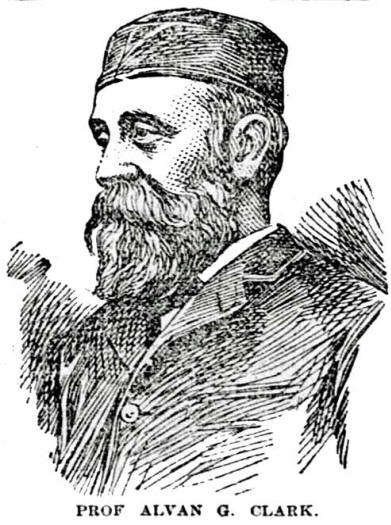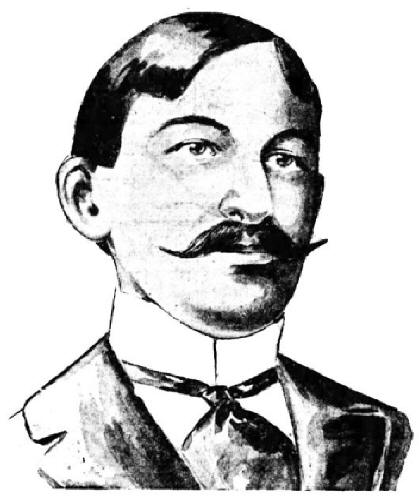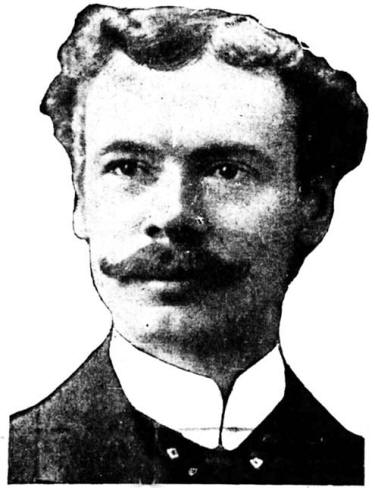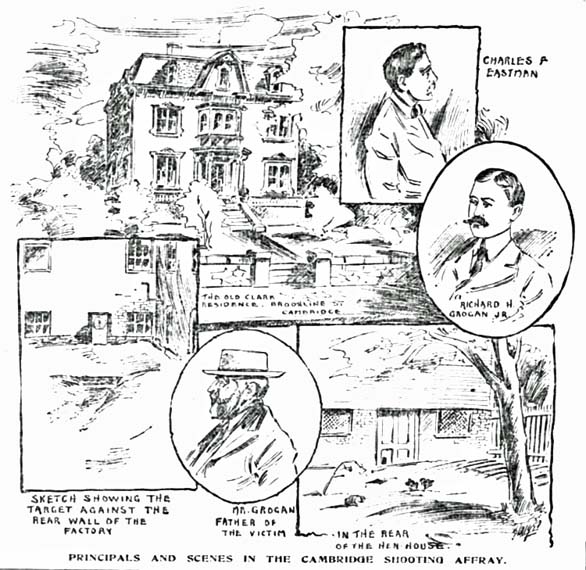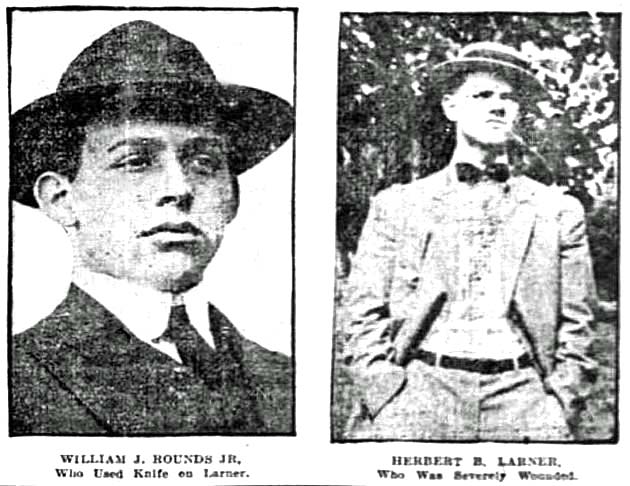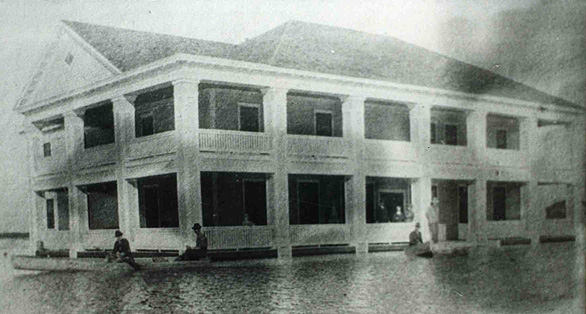|
|
||||
|
|
||||
|
The Grogan family, were no strangers to ill-fated happenings in
their lives which were usually played out on the front pages of
newspapers in Boston and Cambridge, Massachusetts as well as
newspapers across the country.
Beryl’s mother, Elizabeth Willard Clark Grogan (November 10, 1872 -
November 2, 1938), was the daughter of Alvan Graham Clark who was
the son of Alvan Clark, founder of Alvan Clark & Sons. The optic
company, founded in 1846, became famous for crafting lenses for some
of the largest refracting telescopes of the 19th and
early 20th centuries. Elizabeth, as the daughter of Alvan Graham Clark (July 10, 1832- June 9, 1897) and Mary Mitchell Willard Clark (August 3, 1846 - July 10, 1892), had two sisters and a brother, Caroline A. Clark (November 17, 1865 - December 29, 1947), Alvan Clark (June 20, 1870 – March 7, 1885) and Mary Theodora Clark (February 3, 1874 – September 11, 1955).
.
Problems in the family surfaced when Alvan Graham’s daughters
married men of whom he disapproved. Caroline married Charles
Rochester Eastman (June 5, 1868 – October 8, 1918) on June 27, 1892. Elizabeth married
Richard Harmon Grogan Jr. (January 2, 1871 – July 4, 1900) on
September 1, 1893. Mary Theodora married Sumner Russ Hollander (July
28, 1874 - December 12, 1957 in
secret on January 5, 1897.
Alvan G. Clark stabled his horses at the Richard H. Grogan Livery
Stable and his son, Richard Jr., worked with him. It is there that
Elizabeth met him and they fell in love. Her her father did not want
her to marry Grogan even though he was a graduate of Harvard and the
son of the wealthy Brookline livery stable owner. Six months after
their marriage, disaster struck Richard’s family when his father’s
stable caught on fire on the evening of March 17, 1894. Only three
horses out of the 30 in the stable survived the devastating fire and
the loss was estimated at $30,000.
In Elizabeth’s generation, her father’s estate and control of the
company would become the catalysts for strife in the family. The youngest daughter, Mary Theodora Clark, married secretly six months before her father’s death on January 5, 1897, to Sumner Russ Hollander. In June, while Mr. Hollander was on a business trip, she left Boston without telling him of her intention. Upon returning, her husband thought her to be kidnapped and spent quite some time before he finally located her in South Dakota. She agreed to return home and after a tour of the Eastern States, they did so. They also made took a tour of Europe which kept her at her husband’s side. In March, 1898, she disappeared once more and after an exhaustive search, her husband found her in Newville, California. He discovered her sisters had moved her from several asylums to keep her away from him.
Hollander did not believe his wife left of her own free will, but
was influenced by her two sisters. Mrs. Hollander had inherited
$20,000 at her father’s death and $200,000 more would be hers ten
years later. If she died before the end of the ten years, her two
sisters would each inherit $100,000.
Mrs. Hollander’s version of the story was much different. She said
her father objected to her marriage to Hollander due to his
dissolute habits, so she married him secretly. After confessing to
her sisters after their father’s death, her sisters encouraged her
to get away from him. He convinced her to return and for five months
they lived in a house bought and furnished with her money and she
was obliged to pay all of his many bills. Tiring of his episodes
with his intoxicated friends, she chose to leave the second time,
going to California. She stated in a newspaper interview that she
planned to divorce Hollander, but they reconciled and had three
children: Sumner Russ Hollander Jr. (December 23, 1899 –
May 11, 1967; Theodora Hollander Freeman
(October 7, 1902 - November 16, 1976) and Theodore Clarence
Hollander
(May 3,1907- May 28, 1989).
While they were still married, the Hollanders were traveling through
North Wilbraham, Massachusetts, on September 1, 1907, when an
accident occurred. Mrs. James M. Otis and her twelve-year-old
daughter, Dorothy, were alighting from a trolley car and stepped in
the path of Mr. Hollander’s car. He honked the horn and Mrs. Otis
stepped out of the way, but Dorothy did not. She was struck in the
head and died instantly. Mr. Hollander turned himself in and Mary
provided the necessary $2500 bond. A hearing was held on September
11th and several witnesses testified that Hollander did
all he could to avoid the accident. He was exonerated and
discharged.
They were divorced by 1910 and Hollander remarried in 1913 and
1943. Though Hollander came from a wealthy family, Mary believed
that he was more attracted to the money she inherited from her
father than to her.
The next incident in the family was the death of Richard Grogan, Jr.
at the hand of his brother-in-law, Charles Rochester Eastman. Richard Harmon Grogan Jr., son of Richard Harmon Grogan Sr. (1844-1929) and Mary Ann Reid Grogan (1845-1902), was born January 2, 1871 in Brookline, Norfolk, MA. Richard and Elizabeth had a daughter c 1897 that they named Beryl.
On July 4, 1900, Richard H. Grogan, Jr. was shot and killed by his
brother-in-law, Charles Rochester Eastman the husband of Elizabeth’s
sister, Caroline. After the death of Alvan Clark in 1897, Grogan had
taken over operation of Alvan Clark & Sons as well as the Clark
family home in Cambridgeport where the business was located. Strife
arose amongst the other family members believing Grogan had paid too
little for the lens company. Sumner Russ Hollander, husband of the
third sister, Mary, also wanted to acquire the company, but
ultimately it was sold to Grogan.
Eastman was the son of New Orleans attorney, Austin V. Eastman and a
professor at Harvard being the assistant instructor of zoology at
the Harvard Museum, at the time of the affray. Over a year before the shooting, Grogan and Eastman had engaged in intermittent quarrels. The arguing ultimately turned to blows in an altercation at the Grogan livery stable. They were separated by Grogan’s brother, John R., who heard Eastman declare that he would shoot “Dick” Grogan if he had to wait five years. Eastman later declared he made no such threat.
Eastman was arrested about 11:00 that night, arraigned the next day
and held without bail. On July 17 a judge determined there was no
cause to hold him and he returned to the university on August 23rd. That was not to be the end to the Clark-Grogan-Eastman saga. New evidence was discovered and after appearing before the grand jury of Middlesex County, Eastman was indicted for murder and sent back to jail. Trial articles appeared in dozens of newspapers across the country.
The May 13, 1901issue of the Boston Globe used three-fourths
of its Sunday edition front page to announce that the jury, after
deliberating less than five hours, acquitted Charles R. Eastman. Ten
months after the death of Richard H. Grogan, Eastman was released to
his family which gathered at the home of Elizabeth Grogan and her
young daughter, Beryl.
The same issue carried a story about Elizabeth Grogan reporting to
the police that she had received a threatening letter in which the
sender threatened to throw vitriol in her face. An unknown visitor
appeared at her house just before Mr. Eastman and family arrived
after his release. The unknown man fled when he sighted the family
carriages arriving. Beryl Logan was about three-years-old when her father died and was raised by her mother and her extended family. At approximately age 16, she made front page news herself. Her friend, Lillian Rounds was dating, Herbert Larner, a 19-year-old Harvard student against the wishes of her parents. They continued to meet secretly until Lillian’s twin brother, William J. Rounds, found out and challenged Larner to a fight. Larner on the other hand, believed himself to be protecting Lillian from her brother’s cruelty. Lillian was the second for her boyfriend, Rounds, while her sister, Fannie acted as second for their brother. Beryl served as the referee. The outcome was to determine whether Lillian would continue to keep company with Herbert Larner.
The fist fight took place on April 17, 1913 which resulted in Rounds
stabbing Larner five times with his pen knife. Lillian and Beryl
then half carried him to the Grogan home where he was later
transferred to the hospital. For three days his life hung in the
balance. Rounds was arrested and was held for trial by the grand
jury.
The case was finally ended in September, 1913, when both parties
acknowledged satisfaction and the indictments were filed. During the
coverage of the Rounds-Larner affair, the newspapers were quick to
remind the readers of the events surrounding the death of Beryl
Grogan’s father.
Shortly after the fight, Miss Grogan appeared as a witness in a suit
instituted by her mother, Mrs. Elizabeth Grogan, over the property
of the family of her father, Alvan O. Clark.
A few short months later, found Elizabeth and Beryl Grogan in
Buckeye where Elizabeth planned to buy property. Perhaps Elizabeth
felt they both could use some time away from Boston.
Beryl appeared several times in the Buckeye news columns.
Buckeye - Recent arrivals from Massachusetts to
acquire land at Buckeye were, Mrs. E. W. Grogan and Miss Grogan of
Boston.-- The Matagorda County Tribune, January 30, 1914
Buckeye - Mrs. Grogan and Miss Grogan of Boston, Mass., are
among the recent arrivals who will make their home at Buckeye. The
Bashful Bachelors of Buckeye very delightfully entertained a number
of young ladies last Saturday evening at the club rooms in the
Riddle office building. …maids present were…Miss Grogan…-- The
Matagorda County Tribune, March 27, 1914
Buckeye - Mrs. Grogan spent a few days at Houston last week.
Misses Brewer and Grogan and Mr. O’Brien spent Saturday in Bay
City.-- The Matagorda County Tribune, April 3, 1914
Buckeye - Misses Beryl Grogan and Matie Brewer were visitors
to Markham Saturday evening.-- The Matagorda County Tribune,
May 15, 1914
Buckeye - Mrs. Grogan left Saturday for Boston, Mass., where
she went to attend to some business matters, and will return in a
couple of weeks.-- The Daily Tribune, June 18, 1914
Buckeye - Miss Beryl Grogan very pleasantly entertained the
L. B. T. Club Wednesday evening. Mrs. Harry Milnor and Miss Beryl
Grogan went to Bay City Monday.--The Matagorda County Tribune,
June 26, 1914 Beryl had been living at the hotel in Buckeye while her mother was in Boston, but later moved to the farm as evidenced in the letter below.
Apparently Mrs. Grogan’s business matters took longer than she
expected as she was still in Boston on October 21st when
the Matagorda County Attorney, R. R. Lewis, sent a telegram telling
her of the death of her daughter. He also stated Beryl had left a
letter to her mother saying she would “end it all.”
Newspaper articles immediately appeared in Boston and Matagorda
County announcing the death. Once again, the newspapers dredged up
the story of her father’s death and the ill-fated “duel.”
The following letter was published in the Boston Journal,
October 24, 1914.
Buckeye, Tex. Box 4, Dear Chan—Well I guess it’s about time that I wrote you, isn’t it?
I want you to do me a special favor, will you? I have a lot to
explain here and I want you to read each word carefully and to
remember what I’ve written, then destroy this letter. Don’t send it
back to me above all things, as you will understand when you’ve read
further. I want you to give me your word of honor that you won’t say
one word of this to mother, as then she might not come down here.
But once she’s here then I can explain, and I think she will do as I
ask.
Well, here goes: I’m married, but not from choice. When I got in
a row at the hotel, I came up here at the farm. Well, the young man
up here liked me and, well, he was pleasant enough and I liked him
to a certain extent, which he knew, but from choice I wouldn’t have
wanted to marry him. Well, one day he asked me if I’d marry him, but
not enough for that. He didn’t say any more about it for a few days,
then he began again. I put him off and told him to wait till mother came back and ask her. Of course I knew she’d object. So he waited a few more days, then began again about it. We were about broke at the time, but he borrowed $10 from his brother-in-law, who owes him $100.
But I want mother to come down here and make some money. I know
she can, as he’s a good worker and knows all about farming, etc., so
we will do best by him. Then when we’ve made a little depart. Savvy? He says he will never give me a divorce and if I leave him, he’ll hunt me up and kill me the minute he finds me, no matter where I am. But I’m going to take the chance some day and then I’ll find out afterward whether or not I can get a divorce, even if he doesn’t’ sign the paper.”
Walter Chandler, a friend of Beryl’s in Boston said they had corresponded and he had to send her letters registered mail because someone had been tampering with them. Beryl's mother indicated she and other relatives had sent money that never reached Beryl.
Beryl's letter of October 18th explained the problem with her mail.
Buckeye, Tex, Box, 22, Oct. 18, 1914
"My Dear Mother--Received your letter today and you probably have by now received the one which I wrote a few days ago explaining about this letter business. All letters to and from you are interfered with. That I know.
"In fact, the one which I got today was tampered with. That, any one with eyes could see. I know that my husband didn't do it. I certainly do wish that you would make a complaint in Washington, as it might help considerably. We aren't the only ones missing mail either.
"All this letter affair has driven me to desperation, so I am writing this letter in explanation of what I am going to do, also to clear my husband.
"Get me, Steve? That's old, isn't it?
"By the time you receive this I will be dead. You have my love and I will never forget you or what you have done for me.
"Yes, you are right, 'A girl only has one mother,' and I do certainly appreciate it now more than ever I did before.
"Try to think of me sometimes, if you can. I will always think of you, mother. Goodby, forever, with lots and lots of love, I am your own forever.
"Beryl."
The Matagorda County papers announced Mrs. Beryl Kruass was brought
to Walker-Matchett Funeral Home by her husband who discovered her
dead at their home after ingesting Paris Green. The husband paid the
funeral home to embalm and bury her and left. The Matagorda County
authorities investigated and determined her death was a suicide and
her mother was contacted. The following statement by Mrs. Grogan, appeared in the October 24, 1914 issue of the Boston Herald.
"I went down to Texas, thinking we could get away from misfortune, but it seems to have followed us wherever we went. Beryl and I went to Texas last January. We hired Rudolph Klause as foreman of our ranch and grew cotton and cucumbers. We were happy there. Klause is 40 years old and of German descent. In June, I returned to Boston on legal business, and have been so busy that I could not return. Now comes the shock of my daughter's death. My daughter got into a fuss over her English sheep dog, Dorcas. They objected to her having it in the hotel, so Beryl left and went to the ranch house.
According to Mrs. Grogan, she received the following telegram from
County Attorney R. R. Lewis.
“Klause [Krauss] will not permit body to be shipped. Says her dying
request was that she be buried here. Klause has legal control to do
anything further in this matter. He will hold body for your arrival.
Wire if you are coming.”
Elizabeth Grogan responded by saying not to bury her daughter until
she arrived from Boston. Upon her arrival she went directly to the
Matagorda County Sheriff to verify that her daughter’s death was
indeed a suicide and had not died at the hand of her husband.
She then began corresponding with family and friends trying to
obtain the funds to take the body back to Boston for burial. Boston
newspapers reported the holdup was on the Texas end because the
authorities refused to release the body. Matagorda County newspapers
indicated Mr. Krauss was willing for the mother to do as she wished
and that the finances to transport the body back to Boston was the
problem.
After ten days in Texas, Mrs. Grogan returned to Massachusetts to
work to secure funds for the transfer of the body.
The continuing saga was reported in the following Matagorda County
newspaper accounts. The reports begin with the December 4, 1914
issue of the Matagorda County Tribune, six weeks after her
death.
REMAINS OF YOUNG WOMAN
STILL REPOSE IN MORGUE
Prepared for burial and
wholly forgotten by many persons, the mortal remains of Mrs. Beryl
Grogan Krauss still repose at the undertaking parlor of Wm. Walker &
Son in this city awaiting interment. The body, perfectly embalmed,
has lain there since the day after the unfortunate young woman
committed suicide more than a month ago
[October 20, 1914].
With the story of her death
by her own hands and the incidents subsequent thereto, Tribune
readers are already familiar. But the readers of this paper and the
public generally have yet to be informed of the departure of Mrs.
Krauss’ mother, Mrs. Elizabeth W. Grogan for Boston, after her visit
to Bay City following upon the event of her daughter’s tragic death.
Mrs. Grogan came here to claim the body and convey it back to
Massachusetts for respectable interment. Lacking funds for the
accomplishment of this purpose, she announced upon leaving that she
would send the money back to defray the expenses that had been
incurred at this end of the line and to pay the expense of moving
the body back East. Notwithstanding the proprieties involved in the
case, Mrs. Grogan has up to the present failed to let herself be
heard from, in consequence of which the body of her daughter has not
yet been accorded Christian burial.
The latest developments in
the matter are that the good women of Bay City are preparing to
raise a popular subscription and have the remains of the woman
interred in the cemetery here. This step should be taken without
further delay. To permit the body to remain in the morgue would be a
sore reflection on the town.
SHERIFF CARR HEARD FROM
MRS. GROGAN
Sheriff Bert Carr received a
letter last Friday from Mrs. Elizabeth W. Grogan, the mother of Mrs.
Rudolph Krauss, deceased, in which Mrs. Grogan informed him that it
was still her intention to remove the body of her daughter from Bay
City to Boston, Mass. She said that she was experiencing no little
difficulty in arranging her financial affairs so as to admit of the
early removal of the body, but that she expected to raise the money
necessary for this purpose in a few days.
Sheriff Car informs The
Tribune that the corpse is the property of Mrs. Grogan and that she
acquired possession by a legal process, and that no one is at
liberty to dispose of it or exercise any authority with respect to
it except Mrs. Grogan.-- The Matagorda County Tribune,
December 4, 1914
BODY OF UNFORTUNATE WOMAN
STILL HERE
Next Tuesday will be eight
weeks since the body of Mrs. R. Krauss died of poison and was
brought to the Wm. Walker undertaking establishment to be embalmed.
The young husband, of Buckeye, paid the expenses and was preparing
for burial, when the mother, Mrs. Groggan, of Boston, telegraphed to
hold the body till she arrived. A week later the mother arrived and
announced, after the officers had assured her that there was no
doubt the poison was self-administered, that she would remove the
body to her home in Boston for interment. The husband released his
claim to the mother who assumed control of the body. Mrs. Groggan
telegraphed several times to friends back east but failed to raise
the funds necessary to convey the remains home, and after about two
weeks in fruitless effort, she left for the East instructing Mr.
Walker to hold the body till she could go home and telegraph the
money. Three weeks more have elapsed, and letters continue to come
from the mother saying that she will soon send the funds for the
expense of shipment. A good deal has been said about the affair,
some criticisms even being directed at Mr. Walker for holding the
body, some alleging for his costs. This is unfounded, for Mr. Walker
is only holding the body at the urgent request, yes, instruction of
the mother who is the only person authorized to direct its control.
It was even proposed by some of the good women of the town to raise
funds for the burial. So long as the public health interest is not
affected, there is no legal objection to the holding, and no law
that would require its burial against the wish of the mother.
The writer saw a letter ten
days ago from Mr. Krauss, now west of Austin, asking Mr. Walker if
he had heard from Mrs. Groggan, and what disposition of the body had
been made. County Attorney Davant received a letter last week from
Mrs. Groggan saying she would be ready in a few days to have the
remains sent to Boston, but there has been no later word from her.
In the meantime, the Walker
embalming is put to thorough test; and, by the way, this piece of
the embalmers art was the work of the two young students of Mr.
Walker, Payne Walker and Louis Matchett, and it is with some
satisfaction that they are permitted to observe proof of the
excellence of their work.-- Matagorda County News and Midcoast
Farmer, December 11,
1914
Mr. Louis M. Matchett
informs us that we did not get all of the facts in our article last
week; that he is a licensed embalmer and graduate of the Barnes
School of embalming at Chicago, without which he would not have been
able to do the work referred to. He tells us that no word has yet
been received from Mrs. Groggan, and next Tuesday will be the ninth
week the body has been lying in Walker’s undertaking
parlors.—Matagorda County News and Midcoast Farmer,
Bay City, December 18, 1914
BODY TO BE BURIED HERE
Wm. Walker, becoming tired
of the responsibility of holding the body of Mrs. Krause, appealed
to the county officers to have it buried here. So they telegraphed
Mrs. Grogan, mother of the deceased at Boston, that unless she sent
money for transportation of the remains to her by tomorrow the 27th,
body would be interred here.
For fourteen weeks the
embalmed body has been lying in Walker’s undertaking parlor, waiting
on the mother to send money for transportation to Boston, where Mrs.
Grogan has a family vault. Promise has been made by Mrs. Grogan
almost every week to Mr. Walker to send the money for the
transportation, but so far it has not come. Now, tomorrow if it does
not come, the County Judge and County Attorney will have the body
interred here.-- Matagorda County News and Midcoast Farmer,
January 26, 1915
Beryl Grogan In Pauper’s
Grave
Beryl Grogan Krause was
buried yesterday in a pauper’s grave at Bay City, Tex. according to
information in a telegram from W. E. Davant, county attorney,
received by Mrs. Elizabeth Grogan, the girl’s mother, yesterday.
The telegram, which was
dated the day before, stated unless he received word from Mrs.
Grogan immediately the body would be buried yesterday at the expense
of the county. Mrs. Grogan says she at once took the telegram to
Richard H. Grogan, the girl’s grandfather.
Beryl Grogan was left on her
mother’s ranch near Bay City, last fall while Mrs. Grogan came to
Boston. During her mother’s absence she unexpectedly married Rudolph
Krause, a farm hand in the ranch. Shortly afterward she died of
Paris Green poisoning. Mrs. Grogan has always insisted the girl was
murdered.--Boston Journal,
Boston, Massachusetts, January 28, 1915 Unfortunately, Beryl Grogan Krauss, a girl whose notoriety far outweighed her years, was buried at Cedarvale Cemetery in Bay City, Matagorda County on January 27, 1915 in an unmarked grave whose location has been lost to time.
|
||||
|
Of course, the article mentioned the death of Mr.
Grogan at the hand of Mr. Eastman and the death of her daughter who
was buried in a pauper's grave. The newspapers never forgot nor
forgave. |
|
|
|
The funeral arrangements of Alvan G. Clark have been nearly completed. The funeral will be held Sunday, from his late home on Brookline St. Services will be held at the house at 1:30, for the immediate relatives and friends, after which the body will be taken to the Austin St. Unitarian church, arriving there shortly before 2:30. Here services will also be held. Rev. Dr. DeNormandie of Roxbury will officiate, assisted by Rev. A. P. Reccord, pastor of the church. The pallbearers, as far as known, are Prof. Pickering of Cambridge, Mr. Percival Lowell, Mr. Asaph Hall, Mr. Francis Blake, Mayor Alvin F. Sortwell, Mr. Harris and Mr. Joseph Willard of Boston. Messrs Charles F. and Frank B. Hopewell will act as ushers.
Boston Globe, June 11, 1897 |
|
Mrs. Mary Willard Clark, wife of Mr. Alvan G. Clark, the celebrated telescope maker, died yesterday morning at her residence, 186 Brookline St., Cambridgeport, after a long illness The blow is a sad one to the family, following as it does so shortly after the wedding of a daughter, Miss Caroline, to Mr. Eastman. The couple were enjoying their honeymoon, and were in Washington, D. C., when they were called home, and arrived this noon. Mrs. Clark was born in Cambridge in 1846. She was a daughter of Joseph A. Willard, clerk of the Superior Court, and a granddaughter of Prof. Sidney Willard, who was the second mayor of the city of Cambridge. Mrs. Clark was interested in benevolent and charitable work, being a member of the Ladies' Aid Society and the Charity Club. During the recent fair in aid of the Soldiers' Home she was secretary of the Cambridge table. She was an attendant at the First Universalist church, although not a member. A husband and three daughters survive her. The funeral will be held Wednesday afternoon at 2 o'clock. Boston Globe, July 11, 1892 Simple and impressive was the funeral service held over the remains of Mrs. Mary W. Clark, wife of Mr. Alvan G. Clark, this afternoon at 2 o'clock. The funeral was held at her late residence, 186 Brookline Sr., Cambridgeport. There was a large attendance of sorrowing friends. Rev. James de Normandie, pastor of the First church, Roxbury, officiated. There was no singing. The remains were placed in the receiving tomb at Cambridge cemetery until repairs are completed in the family tomb at Mt. Auburn.
Boston Globe, July 13, 1892 |
|
Eastman--In Cambridge Dec. 29, Mrs. Caroline Clark Eastman of 51 Brattle St., Cambridge, daughter of Alvan Clark. Services at the Crothers Chapel of First Church in Cambridge, Unitarian, 3 Church st., Wednesday, Dec. 31, at 3 p. m. Please omit flowers.
Boston Globe, December 30, 1947 |
|
The wedding of Miss Caroline Amelia Clark, daughter of Mr. Alvan G. Clark, the celebrated lens and telescope maker, to Mr. Charles Rochester Eastman, which occurred last evening at the Austin Street Unitarian church, Cambridgeport, attracted a large number of friends. The bride was prettily attired in white silk, cut en traine, with the conventional veil. She carried in her hand a bunch of flowers. The bride was given away at the altar by her father, Mr. Alvan G. Clark. Miss Mary Eastman and Miss Theodora Clark were the bridesmaids. Mr. H. L. Cummings of Pennsylvania was best man. The ceremony was performed by Rev. James De Normandie of the First Church, Roxbury. Miss Georgiana M. Frye presided at the organ. The ushers were Messrs. B. S. Hurlburt, Fred P. Cotting, Guy Pettillo, F. F. Snow, A. W. Dudley and E. B. Dellabarre. A reception to immediate friends and relatives followed at the residence of the bride's parents, 186 Brookline st. After a brief Western tour, Mr. and Mrs. Eastman will reside in Baltimore.
Boston Globe, June 28, 1892 |
|
New York, Sept. 29--The body of a man found drowned at Long Beach yesterday was identified today as that of Dr. Charles Rochester Eastman, widely known American scientist. Dr. Eastman, who had been serving on the War Trade Board at Washington, went to the ocean resort recently to recuperate from influenza. It is believed he collapsed while walking and fell into the sea. Born in Cedar Rapids in 1868, Dr. Eastman was graduated from Harvard in 1890, from Johns Hopkins in 1892 and from Munich in 1894. A naturalist of international reputation, he published many scientific papers on fossil fishes. He was at one time an instructor at Harvard and later at Carnegie Institute. He resigned his connection with the American Museum of Natural History here to become a member of the War Trade Board. Prof. Charles R. Eastman, when an instructor at Harvard, was accused of killing Richard H. Grogan, Jr., He was acquitted of the charge. At one time, the Eastmans lived with Mrs. Grogan at the old Clark mansion in Cambridge. Prof. Eastman was then in the zoological department at Harvard. After the shooting of Richard H. Grogan Jr., determined accidental, the families continued to live under the same roof. Later, the professor went to teach at Carnegie Institute and the Eastmans left Cambridge.
Boston Globe, September 30, 1918 |
|
|
|
|
|
Beryl C. Grogan c 1894 - October 20, 1914 |
|
The funeral of Mrs. Mary Theodora (Clark) Hollander, 82, who died Sunday in Hyannis, will be held today at 11 a. m. at Bigelow Chapel, Mr. Auburn Cemetery. She was the daughter of Alvan Graham Clark, noted astronomer and telescope maker. On her mother's side she was a direct descendant of Joseph and Samuel Willard, presidents of Harvard. She leaves two sons, Theodore C. Hollander of Wenham and S. Russ Hollander, Jr., of Sarasota, Fla.; a daughter, Mrs. Harry B. Freeman of Providence, and six grandchildren.
Boston Herald, Tuesday, September 13, 1955 |
|
Sumner R. Hollander, Sr., 83, of 101 chestnut St., Beacon, Hill, retired president of the Great Lakes Boat Building Corp., and former general manager of John Wanamaker & Sons of New York, died yesterday at his winter residence in Sarasota, Fla. Mr. Hollander was born in Somerville, prepared at Hopkins's School and was graduated from Harvard University in 1897. Until 1908 he was associated with his father, the late Louis P. Hollander, in L. P. Hollander & Co., of Boston. Then he joined the Wanamaker firm as a buyer. He was former president of Holmac, Inc., of New York, wholesale distributors of golf equipment. He was a member of the Algonquin Club. Mr. Hollander leaves his wife, Phyllis; a daughter, Mrs. Harry Bolt Freeman of Providence; and two sons Theodore C., of Hamilton and Sumner R., Jr., of Sarasota. Funeral services will be held at 11 a. m. tomorrow in Sarasota.
Boston Herald, Friday, December 13, 1957 |

